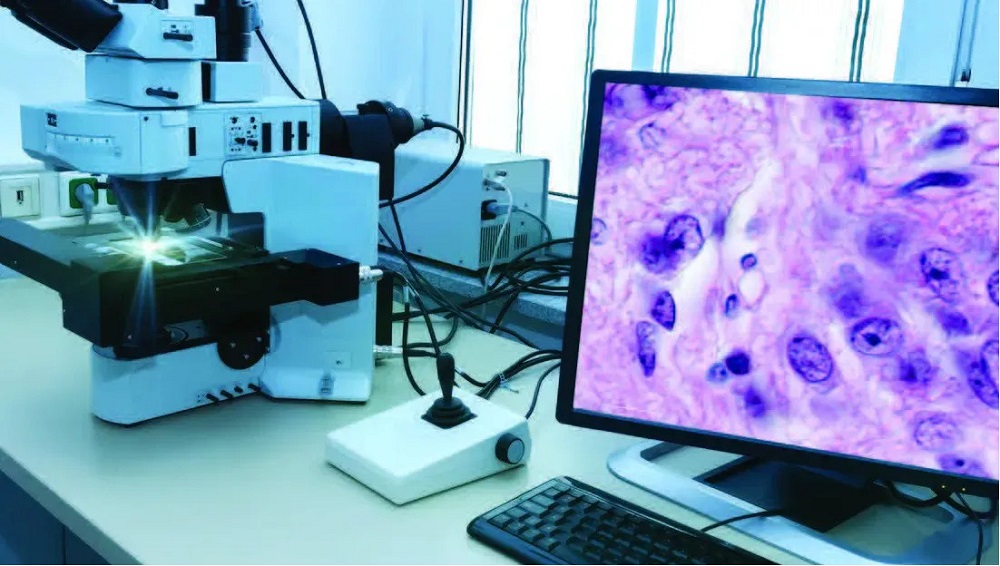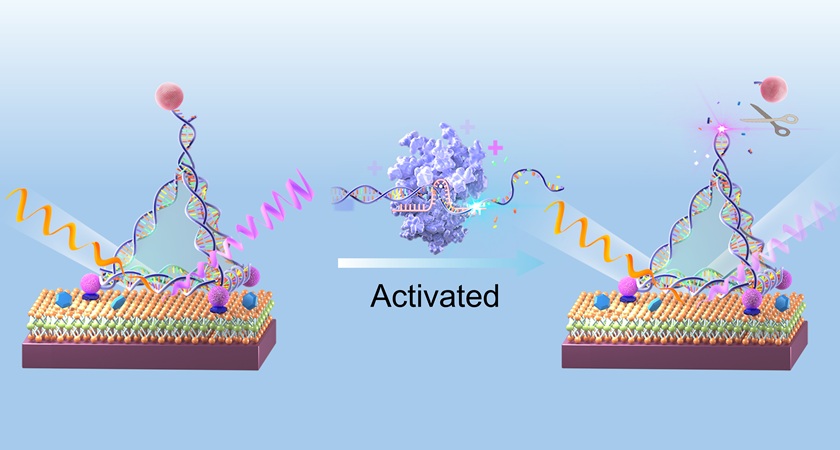New AI Algorithm for Use on Eight Types of Cancer Trained on Seven Scanner Models
|
By LabMedica International staff writers Posted on 04 Oct 2023 |

A new artificial intelligence (AI) algorithm for use on one of the broadest trained environments is now available for commercial or research work.
Gestalt Diagnostics (Spokane, WA, USA) has released the Mitotic Counting algorithm which has been trained on more than 100,000 individual mitosis and across seven scanner models. The algorithm performs impressively with an F1-Score of 0.74, matching the performance of top-of-the-line methods in the field. The algorithm is currently available in the Gestalt AI Studio for use on a variety of cancers including cutaneous mast cell tumors, breast cancer, lymphoma, lung cancer, melanoma, neuroendocrine, colon cancer, and bladder carcinoma. The algorithm has been trained on several scanner models, including those from Hamamatsu, Leica, 3D Histech, and Aperio.
Key to the broad applicability of deep learning algorithms is their ability to adapt to new scanners and different types of tissue; a broad dataset is crucial to achieve this goal. Gestalt Diagnostics' dataset encompasses seven types of tissues spanning eight tumors and is digitized with seven different scanner models. Additionally, Gestalt Diagnostics also offers PathFlow, a smart and customizable workflow solution that offers genuine interoperability for optimal efficiency. This solution supports both digital and glass slides and allows for tailored rules that can be can be configured to meet specific needs and requirements.
"What does this mean for our customers? Confidence,” said Lisa-Jean Clifford, Gestalt COO & Chief Strategy Officer. “Gestalt is focused on providing solutions that provide a foundation of confidence in use as this industry continues to evolve, innovate, and incorporate products that are meant to enhance a pathologist's or scientist's daily life."
"We are extremely proud of the comprehensive approach we take to AI development as an organization,” added Brian Napora, Gestalt VP, AI Solutions. “Our position is to not only look at development and training with a small subset of images or on one or two scanners, that would not prove as effective or accurate as we feel our customers and the industry require. Therefore, we train on tens of thousands images, tumors cells, or in this case, mitosis and multiple scanner models across several scanner vendors to ensure the most accurate, clinically usable options for our customers."
Related Links:
Gestalt Diagnostics
Latest Pathology News
- AI Tool Uses Blood Biomarkers to Predict Transplant Complications Before Symptoms Appear
- High-Resolution Cancer Virus Imaging Uncovers Potential Therapeutic Targets
- Research Consortium Harnesses AI and Spatial Biology to Advance Cancer Discovery
- AI Tool Helps See How Cells Work Together Inside Diseased Tissue
- AI-Powered Microscope Diagnoses Malaria in Blood Smears Within Minutes
- Engineered Yeast Cells Enable Rapid Testing of Cancer Immunotherapy
- First-Of-Its-Kind Test Identifies Autism Risk at Birth
- AI Algorithms Improve Genetic Mutation Detection in Cancer Diagnostics
- Skin Biopsy Offers New Diagnostic Method for Neurodegenerative Diseases
- Fast Label-Free Method Identifies Aggressive Cancer Cells
- New X-Ray Method Promises Advances in Histology
- Single-Cell Profiling Technique Could Guide Early Cancer Detection
- Intraoperative Tumor Histology to Improve Cancer Surgeries
- Rapid Stool Test Could Help Pinpoint IBD Diagnosis
- AI-Powered Label-Free Optical Imaging Accurately Identifies Thyroid Cancer During Surgery
- Deep Learning–Based Method Improves Cancer Diagnosis
Channels
Clinical Chemistry
view channel
Rapid Blood Testing Method Aids Safer Decision-Making in Drug-Related Emergencies
Acute recreational drug toxicity is a frequent reason for emergency department visits, yet clinicians rarely have access to confirmatory toxicology results in real time. Instead, treatment decisions are... Read more
New PSA-Based Prognostic Model Improves Prostate Cancer Risk Assessment
Prostate cancer is the second-leading cause of cancer death among American men, and about one in eight will be diagnosed in their lifetime. Screening relies on blood levels of prostate-specific antigen... Read moreMolecular Diagnostics
view channel
Group A Strep Molecular Test Delivers Definitive Results at POC in 15 Minutes
Strep throat is a bacterial infection caused by Group A Streptococcus (GAS). It is a leading bacterial cause of acute pharyngitis, particularly in children and adolescents, and one of the most common reasons... Read more
Rapid Molecular Test Identifies Sepsis Patients Most Likely to Have Positive Blood Cultures
Sepsis is caused by a patient’s overwhelming immune response to an infection. If undetected or left untreated, sepsis leads to tissue damage, organ failure, permanent disability, and often death.... Read moreHematology
view channel
Rapid Cartridge-Based Test Aims to Expand Access to Hemoglobin Disorder Diagnosis
Sickle cell disease and beta thalassemia are hemoglobin disorders that often require referral to specialized laboratories for definitive diagnosis, delaying results for patients and clinicians.... Read more
New Guidelines Aim to Improve AL Amyloidosis Diagnosis
Light chain (AL) amyloidosis is a rare, life-threatening bone marrow disorder in which abnormal amyloid proteins accumulate in organs. Approximately 3,260 people in the United States are diagnosed... Read moreImmunology
view channelBlood Test Identifies Lung Cancer Patients Who Can Benefit from Immunotherapy Drug
Small cell lung cancer (SCLC) is an aggressive disease with limited treatment options, and even newly approved immunotherapies do not benefit all patients. While immunotherapy can extend survival for some,... Read more
Whole-Genome Sequencing Approach Identifies Cancer Patients Benefitting From PARP-Inhibitor Treatment
Targeted cancer therapies such as PARP inhibitors can be highly effective, but only for patients whose tumors carry specific DNA repair defects. Identifying these patients accurately remains challenging,... Read more
Ultrasensitive Liquid Biopsy Demonstrates Efficacy in Predicting Immunotherapy Response
Immunotherapy has transformed cancer treatment, but only a small proportion of patients experience lasting benefit, with response rates often remaining between 10% and 20%. Clinicians currently lack reliable... Read moreMicrobiology
view channel
CRISPR-Based Technology Neutralizes Antibiotic-Resistant Bacteria
Antibiotic resistance has accelerated into a global health crisis, with projections estimating more than 10 million deaths per year by 2050 as drug-resistant “superbugs” continue to spread.... Read more
Comprehensive Review Identifies Gut Microbiome Signatures Associated With Alzheimer’s Disease
Alzheimer’s disease affects approximately 6.7 million people in the United States and nearly 50 million worldwide, yet early cognitive decline remains difficult to characterize. Increasing evidence suggests... Read moreTechnology
view channel
Robotic Technology Unveiled for Automated Diagnostic Blood Draws
Routine diagnostic blood collection is a high‑volume task that can strain staffing and introduce human‑dependent variability, with downstream implications for sample quality and patient experience.... Read more
ADLM Launches First-of-Its-Kind Data Science Program for Laboratory Medicine Professionals
Clinical laboratories generate billions of test results each year, creating a treasure trove of data with the potential to support more personalized testing, improve operational efficiency, and enhance patient care.... Read moreAptamer Biosensor Technology to Transform Virus Detection
Rapid and reliable virus detection is essential for controlling outbreaks, from seasonal influenza to global pandemics such as COVID-19. Conventional diagnostic methods, including cell culture, antigen... Read more
AI Models Could Predict Pre-Eclampsia and Anemia Earlier Using Routine Blood Tests
Pre-eclampsia and anemia are major contributors to maternal and child mortality worldwide, together accounting for more than half a million deaths each year and leaving millions with long-term health complications.... Read moreIndustry
view channel
QuidelOrtho Collaborates with Lifotronic to Expand Global Immunoassay Portfolio
QuidelOrtho (San Diego, CA, USA) has entered a long-term strategic supply agreement with Lifotronic Technology (Shenzhen, China) to expand its global immunoassay portfolio and accelerate customer access... Read more



















